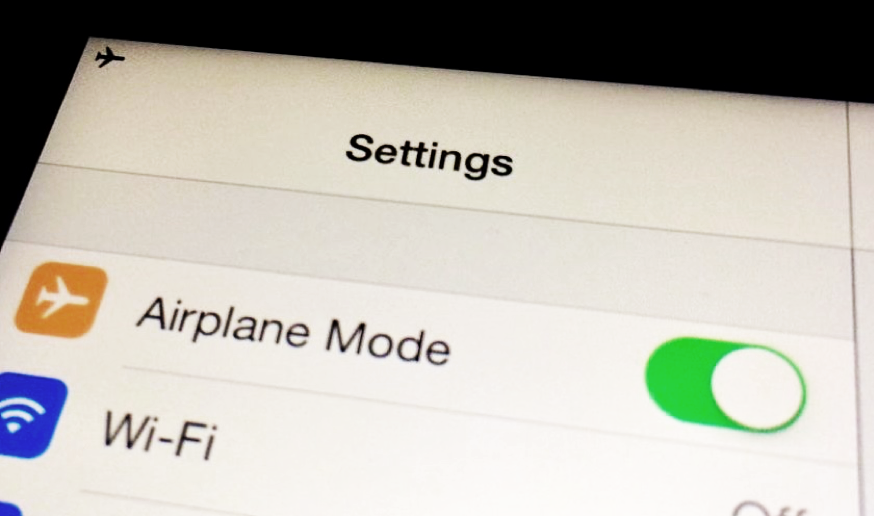
On a flight earlier this year a fellow passenger nearly got himself kicked off the plane for refusing to end his phone call after the cabin doors were closed and we were about to push back. That got me thinking: Is it really a safety risk when you don’t turn switch your phone to Airplane Mode? And will we be able to make calls on U.S. flights any time soon?
A brief Google search told me requiring cell phones to be switched off during take-off and landing did start out as a legit safety concern. When you’re in the air, your cell phone signal bounces off multiple towers and sends out a stronger signal. While this may congest networks on the ground and perhaps interfere with the plane’s communications, there’s never been a case of a switched-on cell phone causing a plane to crash.
I reached out to one of my commercial-pilot friends for more info. He told me the issue isn’t a phone bringing down a plane. The risk is that a cell signal interferes with the plane’s electronics and causes more work and distraction for the pilots during critical phases of flight. I happen to be a pilot and can second this from experience: take-offs and landings are when you need to be paying the most attention to what you’re doing. You don’t need distractions.
But, I asked, aren’t advancements in technology making these risks less likely every year? I mean, since 2014, the European Aviation Safety Agency (Europe’s version of the FAA) has said electronic devices pose no safety risk, although the burden is on airlines wanting to allow them to prove their systems would not be affected by cell phone signals.
A few international airlines have gone through this process, and their passengers are allowed to make in-flight calls through onboard cellular network companies. At least two dozen international airlines, including British Airways, Emirates, Etihad, SAS, and TAP Portugal, allow fliers to chat via voice call. (They can text, too.) Thus far, there have been no major incidents traced to the fact phone calls are allowed.
Voice communications via cell phones are still prohibited on U.S. airlines, per FAA and FCC rules. FAA regs prohibit anything that intentionally emits a signal, which includes cell phones making a voice call. This rule persists despite a 2012 FAA study that concluded calls made via cell phones connected to an on-board cellular telephone base station did not affect the plane’s instrumentation.
“True, modern plane electronics are better shielded now from interruptions,” my pilot friend told me. “The FAA rules are twenty years old, adopted to protect against radio interference to cellphone networks on the ground. Now network technology can be installed directly on the plane”—aka, on-board cellular systems—“and has been used by foreign carriers for years without incident.”
“That doesn’t mean I want calls allowed,” he went on. “Using a phone in-flight can still cause audible interference on the aircraft’s radios. It sounds like a CD skipping which, while not life-threatening, is annoying.”
Even if the FAA and the FCC update their rules to reflect current technology’s capabilities, that doesn’t mean there will be voice calls on U.S. flights. It would be up to individual airlines whether to permit calls or texts. Studies have shown this is a touchy issue, with the pro-call and anti-call camps firmly entrenched and quite adamant about their positions.
“I don’t see the ban going away soon,” my pilot friend said. “More passengers view it as an annoyance rather than a benefit of travel. It’s bad enough sitting close to people who talk loudly to their seatmate. Add cell phone calls and the result would be worse than the current wars over seat reclining.”
I had one last question for him. “Is there a magic detector in the cockpit that tells you if someone’s cell phone isn’t in Airplane Mode?”
“No,” he said, laughing. “We’ve got detectors aft, though. They’re called flight crew. If you forget to switch off your phone, they won’t know. But try to make a call when we’re taking off or landing, and they’ll be on it. Can’t think of many calls that are worth risking criminal prosecution or a lifetime ban by the airline.”
Forgetting to put your device in Airplane Mode could cost you serious cash in another way. A man who left his phone on during a flight from Ireland to the United States received a $300 roaming bill from his service provider. Plane antennas can connect to devices on board as well as the ground below, which means forgotten phones and tablets may be actively racking up charges without their owners knowing.
Twist’s Take: Not switching your cell phone to Airplane Mode won’t bring down the plane, but it can still annoy the pilot. And while you better bring noise-cancelling headphones on international carriers, it appears passengers on U.S. flights will be spared in-flight chit-chat for the foreseeable future.
